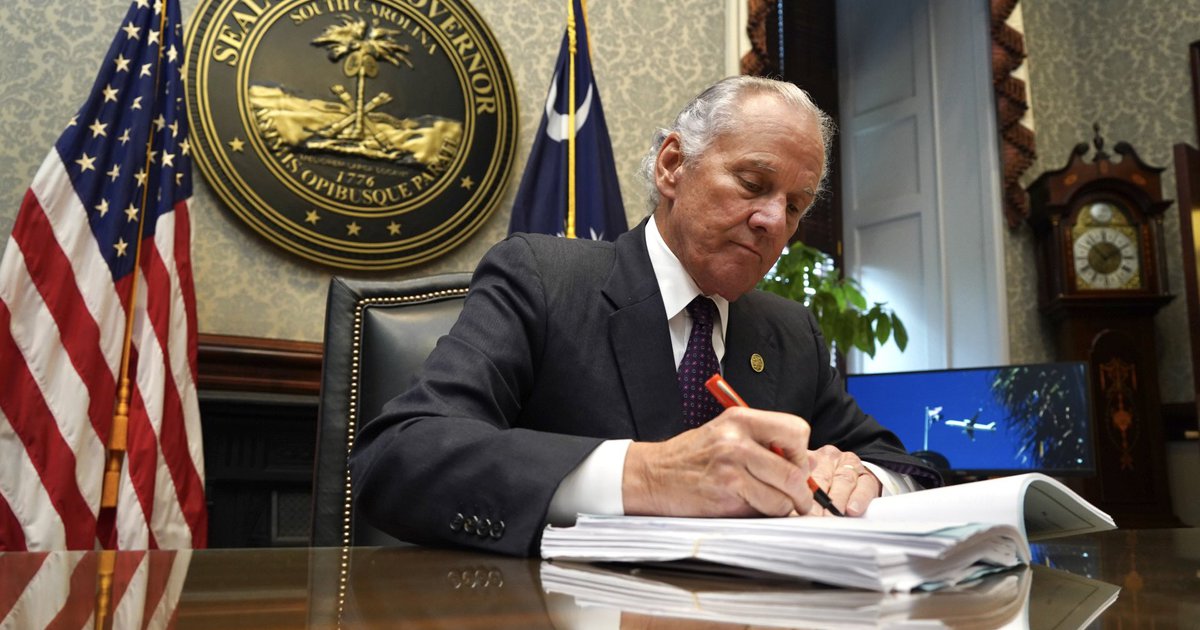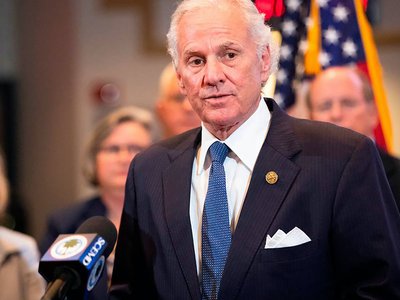Veterans in South Carolina will no longer have to pay state income taxes on their military retirement, as the state joins 35 others with a full tax exemption on these benefits.
From Fort Jackson in Richland County to Parris Island along the Atlantic coast, so many American service members start their careers in South Carolina, and many more make stops along the way at the state’s eight military installations.
South Carolina leaders hope this new law, which Republican Gov. Henry McMaster commemoratively signed just minutes away from Shaw Air Force Base in Sumter County on Wednesday, encourages more veterans to stay in the state once they retire from their service.
“This was, is, and always will be a great military state,” McMaster said.
The state previously offered a partial tax exemption on military retirement income, which veterans receive if they have served at least 20 years.
For more than a decade, some lawmakers, especially those with installations in their districts, had been pushing for the General Assembly to eliminate all state taxes on these benefits, and the bill that does so unanimously passed both the House of Representatives and the Senate this year.
While Wednesday’s ceremonial signing served as a larger celebration for the exemption expansion, McMaster had officially signed it into effect last month. The governor has been one of the major champions of this full exemption at the State House, including it in his executive budget request to the General Assembly every year since taking that office.
“When we talk about being a military friendly state, this is the crown jewel. This is the thing that we had to have, and we kept putting it off,” Sen. Thomas McElveen, D – Sumter, said.
McElveen’s district includes Shaw and now, after redistricting this year, Fort Jackson and edges up against McEntire Joint National Guard Base in Richland County, putting more active-duty service members in his district than any other lawmaker’s.
“We’ve had so many conversations right here in Sumter with military brass, with our airmen and our soldiers, talking about the fact that, ‘I’d love to stay here in Sumter. I’d love to stay here in South Carolina, but it comes down to dollars and cents.’ The folks who are retiring won’t have that excuse anymore because of this legislation,” McElveen said.
Edward Bell, who served 33 years in the US Army and now works for the South Carolina Department of Veterans’ Affairs as its military base support coordinator, said this law is necessary to keep South Carolina competitive in attracting retirees to the state.
“Being a military member, every dollar counts in helping to take care of myself and my family, and it’s huge. It’s a game changer, so we’re going to keep the most critical skillsets that military members have right here in South Carolina because of H.3247,” Bell said. “It’s huge. It’s everything.”
According to the South Carolina Department of Veterans’ Affairs, the military community has a $34.3 billion economic impact annually in the state.
Nearly 400,000 veterans call South Carolina home, including approximately 63,000 retirees who will benefit from the new law, beginning when they file their taxes next year. That military retiree population ranks eighth most among all states.
“Now we’re going to take care of them,” SCDVA Secretary Will Grimsley said. “We’re going to allow them to continue to thrive in this great state and bring their families and have them thrive.”
Lawmakers said this new law isn’t just a show of gratitude for those who served but an assist to the state’s workforce, too.
While these veterans may have ended their service careers, many of them are still too young to retire from the workforce as a whole.
“We have more jobs available than we have people to fill jobs, and we have to concentrate on workforce in this state in order for us to be successful,” Speaker of the House Murrell Smith, R – Sumter, said. “There is a highly trained, ready workforce sitting out there in our military installations all across the state, and this bill right here will incentivize them to stay right here in South Carolina.”
Among neighboring states, North Carolina also offers a full exemption, while an expansion of Georgia’s partial exemption will go into effect this Friday.






